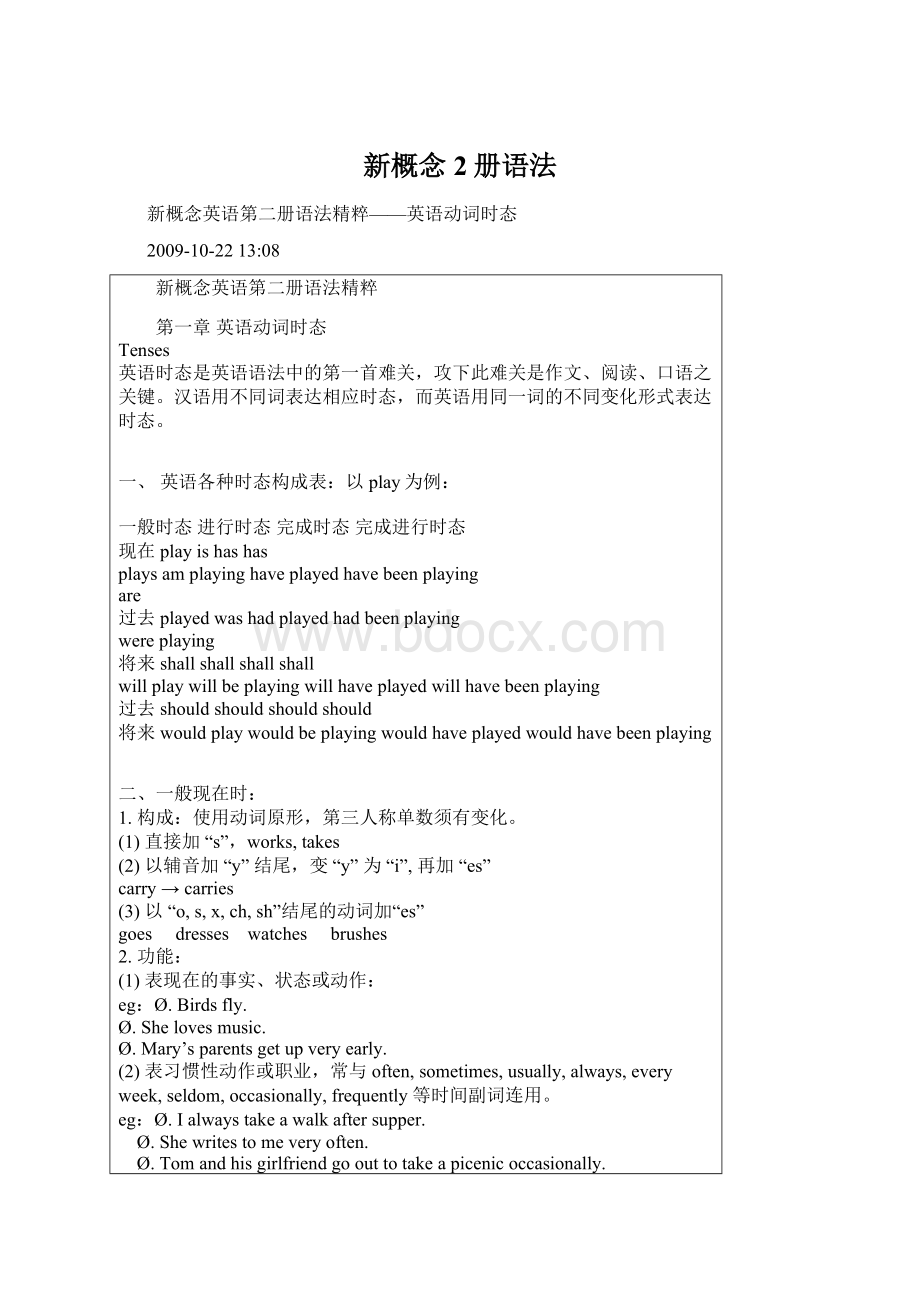 新概念2册语法.docx
新概念2册语法.docx
- 文档编号:5721331
- 上传时间:2022-12-31
- 格式:DOCX
- 页数:12
- 大小:26.47KB
新概念2册语法.docx
《新概念2册语法.docx》由会员分享,可在线阅读,更多相关《新概念2册语法.docx(12页珍藏版)》请在冰豆网上搜索。

新概念2册语法
新概念英语第二册语法精粹——英语动词时态
2009-10-2213:
08
新概念英语第二册语法精粹
第一章英语动词时态
Tenses
英语时态是英语语法中的第一首难关,攻下此难关是作文、阅读、口语之关键。
汉语用不同词表达相应时态,而英语用同一词的不同变化形式表达时态。
一、英语各种时态构成表:
以play为例:
一般时态进行时态完成时态完成进行时态
现在playishashas
playsamplayinghaveplayedhavebeenplaying
are
过去playedwashadplayedhadbeenplaying
wereplaying
将来shallshallshallshall
willplaywillbeplayingwillhaveplayedwillhavebeenplaying
过去shouldshouldshouldshould
将来wouldplaywouldbeplayingwouldhaveplayedwouldhavebeenplaying
二、一般现在时:
1.构成:
使用动词原形,第三人称单数须有变化。
(1)直接加“s”,works,takes
(2)以辅音加“y”结尾,变“y”为“i”,再加“es”
carry→carries
(3)以“o,s,x,ch,sh”结尾的动词加“es”
goes dresses watches brushes
2.功能:
(1)表现在的事实、状态或动作:
eg:
Ø.Birdsfly.
Ø.Shelovesmusic.
Ø.Mary’sparentsgetupveryearly.
(2)表习惯性动作或职业,常与often,sometimes,usually,always,everyweek,seldom,occasionally,frequently等时间副词连用。
eg:
Ø.Ialwaystakeawalkaftersupper.
Ø.Shewritestomeveryoften.
Ø.Tomandhisgirlfriendgoouttotakeapicenicoccasionally.
(3)表客观真理,格言警句或事实:
Ø.Theearthmovesroundthesun.
Ø.Thesunrisesintheeastandsetsinthewest.
Ø.Twoandtwomakesfour.
Ø.Nomanbuterrs.人非圣贤,熟能无过。
(4)表将来:
A.在由when,after,before,as,assoonas,although,because,if,evenif,incase,till,until,unless,solongas,where,whatever,wherever等引导的状语从句中用一般现在时表将来发生的动作。
(黄金重点,所有考试都不放过它!
)
例如:
Ø.I’lltellherwhenshecomestomorrow.
Ø.Evenifitrainsthisafternoon,I’llmeetyou.
Ø.Whateverhappens,youshouldkeepcool-headed.(不错的句型,背下!
!
)
Ø.I’llberightherewaitingforyouwhereveryougo.(很感人的句型!
)
B.按时间表示将要发生的动作或事件,用一般现在时表达将来时概念。
Ø.Theplaybeginsat6:
30thisevening.
Ø.Whendoestheplanetakeoff?
Ø.Heleavesforthatcitynextweek.
Ø.Accordingtothetimetable,theexpresstraintoShanghaistartsatnineinthemorning.(按照时刻表,开往上海的特快列车早上7点出发。
)
测试精编:
1.TheBrowns_______anicecarandbrown’sbrother_______anicejeep.
A.have/have B.has/has C.have/has D.has/have
2.Iftheirhouse_______notlikeours,what_______itlooklike?
A.is/is B.is/does C.does/does D.does/is
3._______youthinkhewillcome?
Ifit_______tomorrow,hewillnotcome.
A.Do/rains B.Are/rains C.do/willrain D.Are/willrain
4.Thelittlechild_______notevenknowthatthemoon_______aroundtheearth.
A.do/move B.do/moves C.does/moves D.did/moved
5.Manyastudent_______fondoffilms,butagoodstudentseldom_______tothecinema.
A.are/goes B.is/goes C.are/go D.is/go
二、现在进行时:
is/am/are+现在分词
1.表示现在正在进行的动作。
如
Ø.Thekettleisboiling.ShallImaketea?
Ø.Don’tyouthinkyoueattoomuch?
You’reputtingonweight.(体重增加)
Ø.Theworkersarebuildinganewbridgeacrossthereiver.
2.表示现阶段正进行的动作。
Ø.Heistakingphysicsthissemester.(本学期)
Ø.Wearepreparingforourfinalexaminationthisweek.
3.go,come,leave,arrive,land,meet,die,start,return,join,etc.用于进行时态时表示 即将开始的动作。
Ø.Look!
Thebusiscoming.看!
车来了!
Ø.Theoldmanisseriouslyill,andheisdying.
Ø.AliceisleavingforBeijingwithhermother.
4.与always,forever,continually,constantly等副词连用,表示说话人带有感情色彩:
赞赏或厌恶。
Ø.Heisalwaysthinkingofothers.(他总是想着别人。
)
Ø.Theboyiscontinuallymakingnoises.(这男孩不断地发出吵闹声。
)
Ø.Theteacherisconstantly(always)criticizingherforbeinglate.(老师一直在批评她迟到。
)
5.下面表示状态、感觉、情绪、精神活动的动词不可用于进行时。
(此条戒律请背10遍!
!
!
)
believe(相信),doubt(怀疑),see(看见),hear(听见),know(知道)
understand(理解),belong(属于),think(认为),consider(认为),feel(觉得)
look(看起来),seem(看上去),show(显示),mind(介意),have(有)
sound(听起来),taste(尝起来),require(要求),possess(拥有),care(关心)
like(喜欢),hate(讨厌),love(喜爱),detest(憎恨),desire(意欲)
【简单记忆】:
●永远不要说I’mbelieving…或Heisseeingahouse.再简单一点说,这些动词后面不要随意加–ing.
●可怕的是:
我们在写作及口语中常犯此类大错!
●注意:
haveaparty/thinkabout可以用进行时,因为这里have意为“举行”;think意为“考虑”。
测试精编:
1.Howcanyou_______ifyouarenot_______?
A.listening/hearing B.hear/listening
B.belistening/heard C.behearing/listeningto
2.Thegirlevenwon’thaveherlunchbeforeshe_______herhomework.
A.willfinish B.isfinishing
C.hadfinished D.finishes
3.Thosewhohaveappliedforthepost(职位)_______intheoffice.(此题超前)
A.arebeinginterviewed B.areinterviewing
C.interviewing D.tobeinterviewing
4.Theoldscientist_______todomoreforthecountry.
A.iswishing B.hasbeenwishing
C.wishes D.hasbeenwished
5.Ifhe_______,don’twakehimup.
A.stillsleeps B.isstillsleeping
C.stillhasbeensleeping D.willbesleepingstill
三、一般过去时。
定义动词的过去式:
1.表示过去某个特定时间或某一段时间发生的动作或情况。
Ø.Wevisitedtheschoollastspring.
Ø.IwenttoschoolbybikewhenIwasinmiddleschool.
Ø.Chinawasfoundedin1949.
2.表示时间或条件等的状语从句中代替过去将来时。
(参)
Ø.Shetoldmethatshewouldnotgowithusifitrainedthenextday.
Ø.Theywouldnotlaveuntilshecameback.
Ø.Myfriendpromisedtomarrymeonceshemadeherfinaldecision.
3.一般过去时,现在时和过去时的几组差异:
(别以为这很简单,下面的差异你不一定明白。
)● Herbrotherwasachemist.(已去世)
● Herbrotherisachemist.(尚健在)
●That’sallIhadtosay.(话已说完)
●That’sallIhavetosay.(言之未尽)
●Itwassonicetoseeyou.(离别时用)
●Itissonicetoseeyou.(见面时用)
●Janedidalotofworkthismorning.(已是当天下午或晚上)
●Janehasdonealotofworkthismorning.(仍是上午)[本句现在完成时,此乃后话!
]
测试精编I:
(用所给动词的正确形态填空)。
1.YesterdayI_______(think)thatyouwerenotinBeijing.
2.Aliceusually_______(sit)inthefrontoftheclassroom,butshe_______(sit)atthebackthismorning.
3.He_______(tell)thenewstousthreedaysago.
4.He_______(begin)toteachChinesein1990.
5.Shewouldnottelephonemeifshe_______(have)notime.
测试精编II:
1.They_______thetripuntiltherainstopped.
A.continued B.didn’tcontinue
C.hadn’tcontinued D.wouldcontinue
2.Thelocalpeasantsgavethesoldiersclothesandfoodwithoutwhichthey_______ofhungerandcold.(without在这里表示条件,你知道吗?
)
A.woulddie B.willdie C.wouldbedead D.wouldhavedied
3.ItwasnotuntilthenthatIcametoknowthattheearth_______aroundthesun.
A.moved B.hasmoved C.willmove D.moves
4.Whenallthosepresent(到场者)_______hebeganhislecture.(重点题)
A.sit B.set C.seated D.wereseated
5.IfIhadhadtime,Iwouldhavewrittentoyou.Butinfact_______not.
A.have B.wouldhave C.had D.hadhad
四、过去进行时:
were/was+现在分词。
1.表示过去某一时刻或阶段正在发生的动作。
Ø.Iwasplayingchessat8yesterdayevening.
Ø.WhenIarrived,theywerewatchingTV.
Ø.Theyweredoinghouseworkthistimelastweek.
2.用于条件状语从句中表示过去将来进行的动作。
Ø.Shetoldmetowakehimupifshewassleeping.
Ø.IaskedmyfriendtowarnmeaboutitaslongasIwasdrivingtoofast.
3.过去某时将发生的事。
可参考2(4)
Ø.TheytoldmethattheywereleavingforNewYork.
Ø.HewasgoingoutwhenIarrived.
测试精编:
1.Mybrother_______whilehe_______hisbicycleandhurthimself.
A.fell/wasriding B.feel/wereriding
C.hadfallen/rode D.hadfallen/wasriding
2.He_______hislegashe_______inafootballmatch.
A.broke/played B.wasbreaking/wasplaying
C.broke/wasplaying D.wasbreaking/played
3.Myfatherwillbeheretomorrow.
Ithoughtthathe_______today
A.wascoming B.iscoming
C.willcome C.comes
4.Jcakwasgoingoutoftheshopwhenhecollidedwithanoldwomanwho_______in.
A.come B.wascoming C.hadbeencoming D.hadcome
5.Michikecouldn’tcometothetelephonewhenMr.Smithcalledherbecauseshe_______inthelab.
A.hadbeenworking B.hasbeenworking
C.wasworking D.worked
五、现在完成时:
have/has+过去分词
1.表示过去所发生的动作对现在的影响或产生的结果。
常与yet,just,before,recently,lately(最近),ever,never等表时间的副词搭配使用。
● Hehasn’tseenherlately.
● Ihaven’tfinishedthebookyet.
2.表示一个从过去某个时间开始,延续到现在并可能持续下去的动作,常与表示一段时间的时间状语连用。
如:
sofar(迄今为止),uptillnow(直到现在),since,foralongtime(很长时间),uptopresent(直到现在),inthepast/inthelastfewyears(在过去的几年里),thesedays(目前)……
Ø.Hehasworkedherefor15years.
Ø.IhavestudiedEnglishsinceIcamehere.
Ø.TheforeignerhasbeenawayfromChinaforalongtime.
Ø.Sofar,Ihaven’treceivedasingleletterfrommybrother.
3.某些非延续性动词(即:
动作开始便终止的动词),在现在完成时中不能与表示一段时间状语搭配。
黄金要点:
I. 常见的非延续动词:
die,arrive(到达),join(加入),leave(离开),go,refuse(拒绝),fail(失败),finish,buy,marry,divorce(离婚),awake(醒),borrow,lend…(背三遍!
)
II. 这类动词并非不能用现在完成时,而是不能接常由for引导的时间状语。
III. 但若是用在否定句中,非延续动词的现在完成时可以与表示一段时间的状语连用。
● Shehasgoneawayforamonth.(误)
● Shehasbeenawayforamonth.(正)
● Themanhasdiedfortwoyears.(误)
● Themanhasbeendeadfortowyears.(正)
● Howlonghaveyouboughtthebook?
(误)
● Howlonghaveyougotthebook.(正)
4.注意since的用法:
Ø.Theyhaven’thadantroublesincetheycamehere.
Ø.Ithasbeentenyearssincewemelasttime.
Ø.Hehasbeenheresince1980.
Ø.Hehasbeenheresincetenyearsago.
5.几组对比:
HehasgonetoShanghai.他到上海去了。
HehasbeentoShanghai.他去过上海。
Shehasgone.她已走了。
Sheisgone.她缺席了。
(or她死了)
Thedoorhasbeenclosed.门关上了。
(动作)
Thedoorisclosed.门是关着的。
(状态)
测试精编:
1.Theprices_______goingupallthetimeinthepastfewyears.
A.keep B.kept
- 配套讲稿:
如PPT文件的首页显示word图标,表示该PPT已包含配套word讲稿。双击word图标可打开word文档。
- 特殊限制:
部分文档作品中含有的国旗、国徽等图片,仅作为作品整体效果示例展示,禁止商用。设计者仅对作品中独创性部分享有著作权。
- 关 键 词:
- 新概念 语法
 冰豆网所有资源均是用户自行上传分享,仅供网友学习交流,未经上传用户书面授权,请勿作他用。
冰豆网所有资源均是用户自行上传分享,仅供网友学习交流,未经上传用户书面授权,请勿作他用。


 铝散热器项目年度预算报告.docx
铝散热器项目年度预算报告.docx
